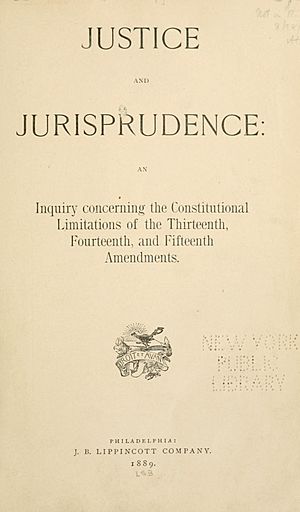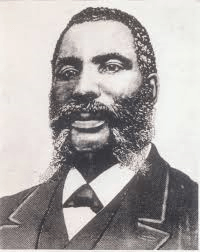Justice and Jurisprudence facts for kids

Cover page of the first edition, 1889
|
|
| Author | Anonymous (affiliated with the Brotherhood of Liberty) |
|---|---|
| Published | 1889 (J. B. Lippincott & Co.) |
Justice and Jurisprudence is an important book published in 1889. It was written by a group called the Brotherhood of Liberty. This book looked closely at decisions made by the Supreme Court of the United States about the Reconstruction Amendments. These amendments were added to the U.S. Constitution after the Civil War. The book is special because it's one of the first big books about law written by Black people. It helps us understand what African Americans thought about legal issues in the late 1800s.
Contents
The Story Behind the Book
The journey for Black lawyers in the U.S. was long. In 1844, Macon Bolling Allen became the first African American lawyer in the United States. He passed his bar exam in Maine. Later, in 1865, John Swett Rock was the first Black person allowed to argue cases before the Supreme Court of the United States.
Forming the Brotherhood of Liberty
In Maryland, Black people faced rules that stopped them from becoming lawyers. Because of this, a group called the Brotherhood of Liberty was started in Baltimore on June 2, 1885. Their main goal was to fight against unfair rules that denied liberty based on race. They wanted to use legal ways to get and keep their rights as citizens.
One of their first successes was when Everett J. Waring was allowed to become a lawyer in Maryland that same year. Even after achieving this goal, the Brotherhood kept working. They continued to fight for equal rights for Black citizens.
Who Wrote the Book?
In 1889, the Brotherhood of Liberty published Justice and Jurisprudence: An Inquiry Concerning the Constitutional Limitations of the Thirteenth, Fourteenth and Fifteenth Amendments. The book was 578 pages long and was published by J. B. Lippincott & Co.. It sold for $3.00.
Some people believe that a white lawyer named John Henry Keene wrote most of the book. They think that only the first 43 pages were written by the Brotherhood, possibly by Harvey Johnson, a reverend in Baltimore. However, others disagree. They suggest that Black lawyers like Everett J. Waring and others played a big part in writing it.
What the Book is About
Justice and Jurisprudence asked for a careful study of court decisions. It focused on rulings that seemed to hide the true meaning of the Fourteenth Amendment. This amendment grants citizenship and equal legal rights to all people born in the U.S.
The book argued that Black people born in the country should automatically be considered U.S. citizens. It also said that daily life for citizens should be "free, easy, elastic, and natural." The authors wanted a legal system that was fair to Black citizens.
Criticizing Court Decisions
The book had 46 chapters that strongly disagreed with decisions made by the Supreme Court of the United States. For example, it criticized the Civil Rights Cases. The Brotherhood believed these cases wrongly understood the Reconstruction Amendments.
The book argued that the Supreme Court sometimes ignored past legal decisions. It claimed the Court changed the meaning of words to get the results they wanted. The authors felt that some decisions were based on prejudice and politics, rather than on higher laws and moral progress.
 | Isaac Myers |
 | D. Hamilton Jackson |
 | A. Philip Randolph |


